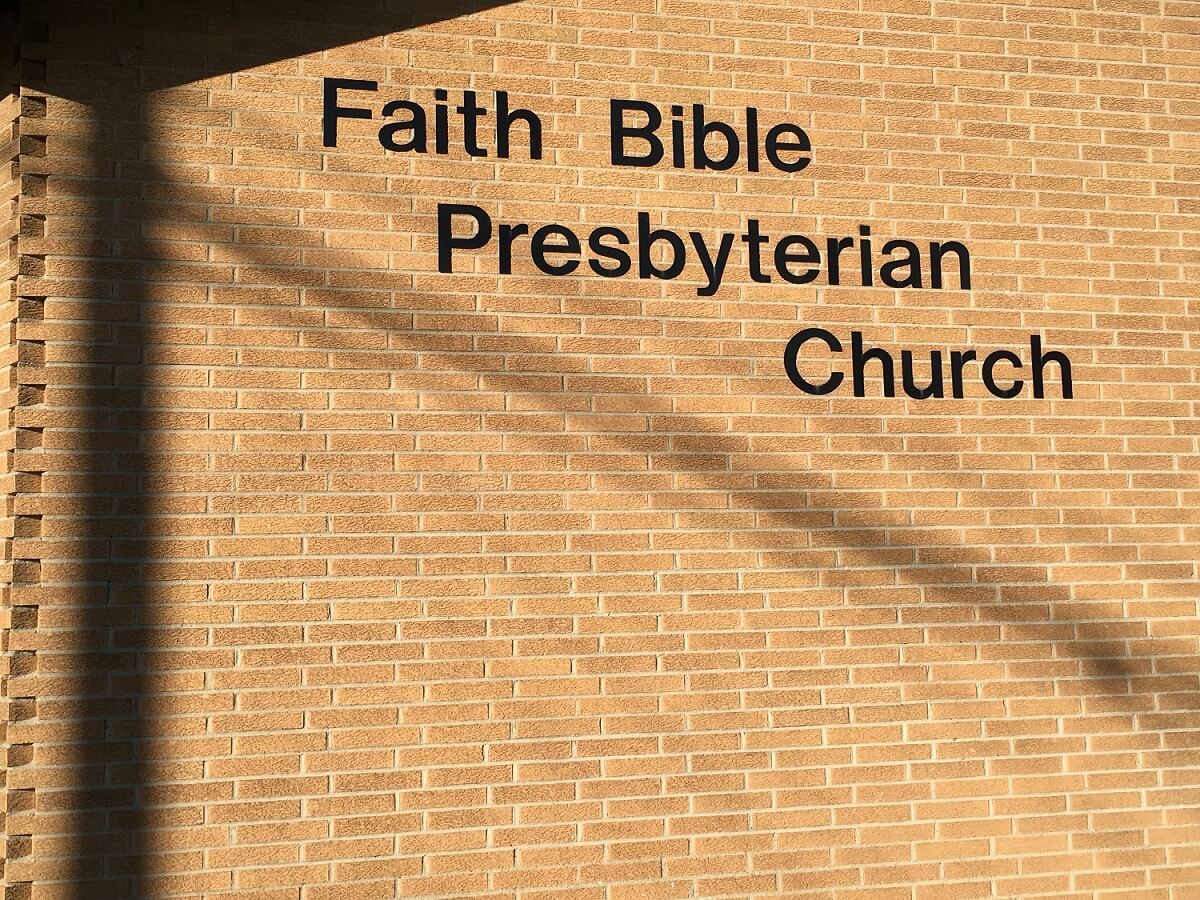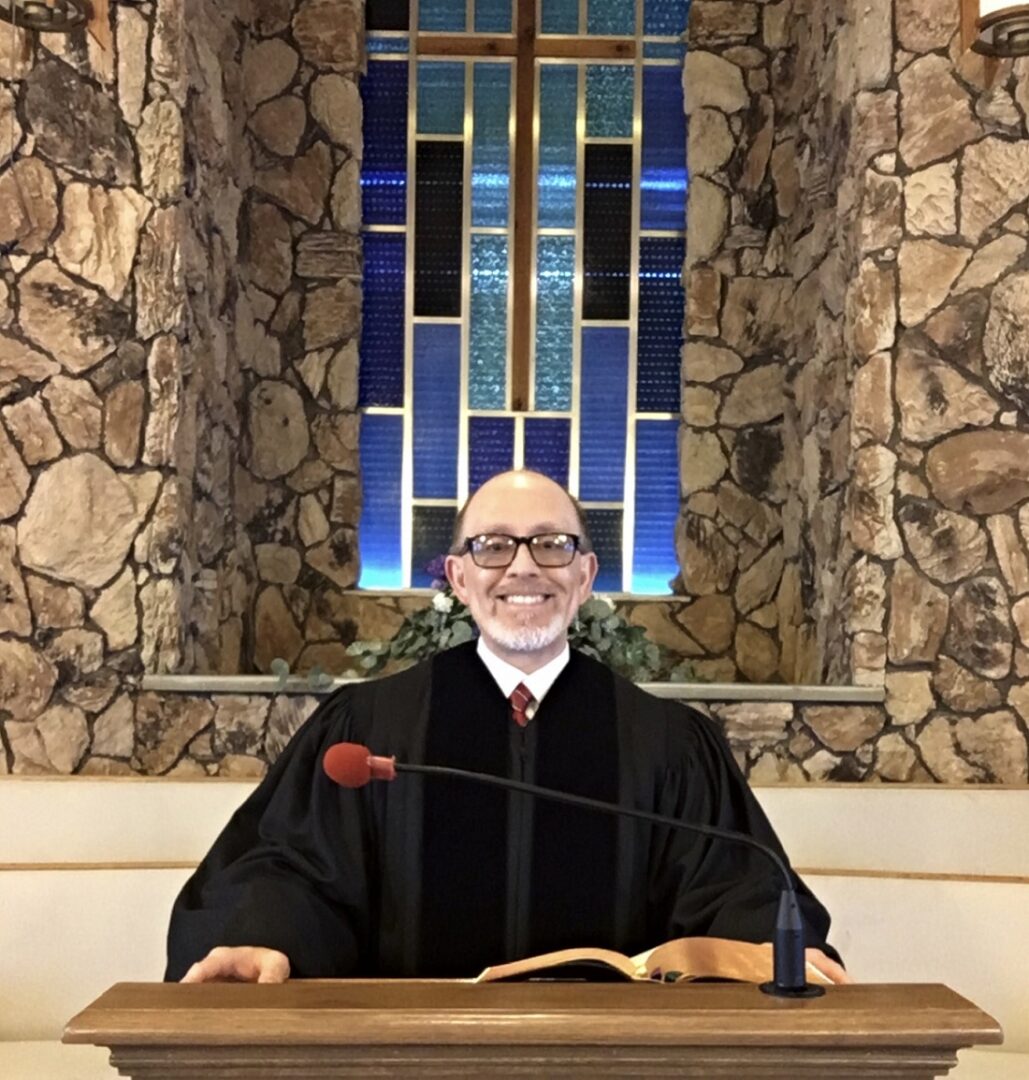About Us

Equipping God's People to Glorify & Enjoy Him
Faith Bible Presbyterian Church was founded by our Lord and Savior Jesus Christ through the instrumentality of Pastor John C. Mills in 1970. The church began airing the “Faith Bible Hour” radio ministry in 1976. Four years later, the congregation moved into our current place of worship in Trenton.
In 2008 Pastor Mills officially retired from full-time ministry, and our Lord and Savior Jesus Christ confirmed His calling upon Pastor Wayne C. Villarreal into the pastoral ministry by making him His undershepherd of the church. Pastor Villarreal is a graduate of the Moody Bible Institute.
Our Mission
God desires sinners to be saved and then built up in the holiest “faith which was once for all delivered to the saints” (Jude 3). Therefore, our mission is singular and yet threefold. Our overarching mission is to fulfill man’s chief end, which is to glorify God and to enjoy Him now and forevermore (Isa. 43:7; 1 Cor. 10:31). God created us for that specific purpose. We all exist to glorify God and to enjoy Him forever.
It is in light of our overarching mission we are making and maturing disciples/or followers of the Lord Jesus Christ by teaching men, women, and children to worship Him in spirit and in truth (Matt. 28:18 – 20; Joshua 24:14; John 4:24). The manner in which we are seeking to do this is threefold:
Again, our objective here at Faith Bible Presbyterian Church is singular: to glorify and enjoy God in and through His Son the Lord and Savior Jesus the Christ by seeing others saved, instructing the saints from the Holy Scripture, and by earnestly contending for the Historic Christian Faith as it is expressed in the Sacred Scripture (Matt. 1:23, 25).
We are a Bible-believing and Christ-honoring Church that is committed to teaching the Word of God with diligence and authority. We believe in the total sovereignty of God, the Premillennial Return of Christ, and separation from sin and unbelieving churches.
We are represented internationally by our Missionaries under The Independent Board for Presbyterian Foreign Missions.
We invite you to join us in worshipping the Creator, the one and only true and living God and Savior, the Lord Jesus Christ.
Service Times and Events
Service Times
Sunday School: 9:45 AM
Sunday Morning Worship: 11:00 AM
Sunday Evening Worship: 6:00 PM
Wednesday Prayer Meeting: 7:00 PM
Monthly Breakfast
On the second Saturday of each month, members of our family of Faith break bread with one another.
Fellowship Luncheon
Once a month, immediately following Sunday morning worship, we gather into the fellowship hall to break bread with one another (Acts 2:42). You are welcome to join us.
Vacation Bible School
“Jesus My Savior and Friend”
June TBD
Our program will run each day from 6:00 PM to 7:30 PM
For ages 5-14
There will be fun, games, crafts, prizes!
For more information, please call the church office (734) 676–2344.
Church Building
Under the direct supervision of the Elders, our facility is reserved for the use of the members of Faith Bible Presbyterian Church.
Faith Bible Presbyterian Church’s Doctrinal Positions
related to its Doctrinal Statement

Notes elaborating the Doctrinal Statement
The Inspiration and Inerrancy of the Bible
Revelation is God’s self-disclosure. It is God making Himself known to men. God has revealed Himself in a limited way in creation. But the Bible is a form of special revelation. The Bible is a “special” revelation in the sense that it goes beyond what may be known about God through nature. It is divine in origin since in the Bible, God makes known things which otherwise could never be known (I Cor. 2:11-16; Ps. 19:1; Rom. 1:19, 20).
The Bible is unique because it is God’s revelation recorded in human language. According to II Timothy 3:16–17, the words of Scripture are “God-breathed” or inspired. This implies that God is the source or origin of what is recorded in Scripture. God, through the Holy Spirit, used human authors to write what He revealed in the Bible. They were not mere copyists or transcribers. The Holy Spirit guided and controlled the writers of Scripture, who used their own vocabularies and styles but wrote only what the Holy Spirit intended. This is true only of the original manuscripts, not the copies or translations. Although the original manuscripts have been lost to us, God has preserved the biblical text to a remarkable degree (II Tim. 3:16,17; II Peter 1:21, I Cor. 2:12-13).
The Bible is verbally inspired. This means that the words of the Bible, not just the ideas, were inspired. What is more, this is true of not just some, but all the words of the Bible. As a result, the Bible is free from error in what it says. Faith Bible Presbyterian Church believes strongly in the factual, verbal, historical inerrancy of the Bible. That is, the Bible, in its original documents, is free from error in what it says about geography, history, and science as well as in what it says about God. Its authority extends to all matters about which the Bible speaks. It is the supreme source of our knowledge of God and the salvation provided through His Son, the Lord Jesus Christ. It is our indispensable resource for daily living (Matt. 5:18; John 10:35; 5:39-47; II Tim. 3:16,17; I Peter 2:2).
Even though the Bible is God’s revelation, it must still be interpreted. Interpretation has to do with our reception and understanding of that which God revealed and recorded. A revelation is a divine act. Interpretation is a human responsibility. Divine inspiration guarantees the truthfulness of God’s word but not the accuracy of our interpretation. The Bible is infallible in all it affirms to be true and therefore absolutely reliable. We, however, may be fallible in our interpretation of the Bible (John 16:13).
The Deity of Jesus Christ
The Bible directly states that Jesus is God in a number of passages. Taken by themselves, these verses provide enough evidence for the church to believe in and teach the deity of Jesus Christ. But the indirect evidence of Scripture is equally compelling (John 1:1, 20:28; Rom. 9:5; Phil. 2:6; Titus 2:13, Heb 1:8; I John 5:20. Other passages include John 13:3, 17:5, Col. 1:15-19, I Tim. 3:16; Heb. 1:3).
The names of God are often applied to Jesus. He is called “the Mighty God, the Everlasting Father” and “Immanuel” (meaning “God with us”). Elsewhere Jesus is called “The Lord (Jehovah) our Righteousness,” “God,” and “Son of God” (Isa. 9:6; 7:14; Matt. 1:22–23; Jer. 23:6; Isa. 40:3; Heb. 1:8; I Tim. 3:16; John 10:36).
The Bible ascribes the characteristics of deity to Jesus Christ. He is described as eternal, omnipresent, omniscient, omnipotent and immutable (Eternal: Isa. 9:6; Mic. 5:2; John 1:1, 2; 8:58; 17:5; 24; Col. 1:15, 17; I John 1:1; Rev. 1:8. Omnipresent: Matt. 18:20; 28:20; John 3:13. Omniscient John 2:24, 25; 16:30; 21:17; Rev. 2:23. Omnipotent: Isa. 9:6; Phil. 3:21; Rev. 1:8; cf. John 5:17; Heb. 1:3; Matt. 28:18. Immutable: Heb. 1:10-12; 13:8).
Jesus Christ is equal with God the Father. He is worshiped as God. His name is assigned equal standing with God the Father in the church’s baptismal formula and in the apostolic benediction (John 20:28; Acts 7:59; Heb. 1:6; cf. Exodus 34:14; Matt. 4:10. Matt. 28:19; cf. Acts 2:38; II Cor. 13:14; cf. I Cor. 1:3, Eph. 1:2).
Christ performed works which only God can do. He is the creator. He is the upholder of all things. He forgives sin. He will raise the dead and execute judgment. (John 1:3, 10; Col. 1:16; Heb. 1:2,10; Col. 1:17; Heb. 1:3; cf. Luke 10:22; John 3:35; 17:2; Eph. 1:22. Matt. 9:2-7; cf. Mark 2:7; Luke 7:47, 48; Col. 3:13. John 11:25; cf. John 5:25, 28-29; 6:39, 40, 54; John 5:22).
Jesus Christ Himself claimed deity. He taught His disciples to pray in His name. He claimed that He and the Father were one and that He was the Son of God. He claimed that to know Him was to know God, to see Him was to see God, to receive Him was to receive God, to believe Him was to believe in God, and to honor Him was to honor God, while to hate Him was to hate God (John 16:23, 24; 10:30, 36; 14:9; 17:11; 8:18; 14:7; 12:45; 14:9; Mark 9:37; John 12:44; 14:1; 5:23; 15:23).
The Virgin Birth
We believe that the eternal Son of God “took upon Him our nature, being conceived by the Holy Spirit and born of the Virgin Mary.”
The virgin birth is implied in the Old Testament as early as Gen. 3:15, which promised that “the seed of the woman” would be the victor over Satan and sin. It is expressly predicted in Isaiah 7:14: “Behold, a virgin will be with child and bear a son, and she will call His name Immanuel”. According to Matt. 1:22–23, this prophecy was fulfilled in Mary. She is called a “virgin” in Luke 1:27. The Greek term parthenos has the meaning of “maiden” or “pure virgin”. Mary did not conceive through ordinary means but through the Holy Spirit. This was God’s miraculous intervention, producing offspring without a human father. No man or angel was involved. Christ, who was God from all eternity, took hold of this human nature thus conceived and joined it to Himself (Matt. 1:18; Luke 1:26-28, 35; Phil. 2:7; Heb. 2:14).
What called for virgin birth? The fundamental need was found in the nature of the human race. Every normal human birth produces another sinner, just as Adam, as a sinner, produced a race of sinners. Our Savior had to be genuinely human and truly sinless to be our perfect substitute and pay our penalty of guilt before an infinite God by His death (Gen. 5:1-3; Rom. 5:15-21; Eph. 2:1-2; I Pet. 1:18-19; Heb. 9:14).
This doctrine stands at the heart of the Lord’s person and saving work. Without the virgin birth, there would be no salvation for sinners. Jesus Christ would be a sinful human being. If the virgin birth did not occur, then the Bible is not true and cannot be trusted. In short, it is an essential part of salvation and of Scripture. We unashamedly believe and teach the virgin birth of Jesus Christ.
The Substitutionary Atonement
According to the Scriptures, sin must be paid for. When Jesus Christ died, he suffered as a substitute in the place of and on behalf of fallen humanity. Christ’s death made it possible for men and women to be declared righteous, based on their faith in Him. Christ’s death was not merely a statement against evil or an expression of love, but a payment that satisfied God’s demand. Christ’s death was necessary for several reasons (Rom. 6:23; I Peter 1:18, 19; Matt. 20:28; Rom. 3:21; II Cor. 5:21).
First, sin alienates us from God. Those who are controlled by sin cannot please God. Jesus Christ’s death made peace with God possible. Christ came, not just to provide us with a godly example, but to die on our behalf and to bear the cost for sin (Eph. 2:12; Rom. 8:5-8; Col. 1:20-21; Gal. 3:13).
Second, God is holy. God’s holy character requires that sin be punished. Sin makes us the objects of God’s wrath until the penalty of sin is paid. By laying down His own life, Jesus paid the price on our behalf, satisfying God’s demand. This payment was made, not to Satan, but God (I John 1:5; Rom. 3:4, 24-26; 1:18; 6:23; John 10:17, 18; II Peter 2:1; Matt. 20:28).
Third, the presence of sin renders us helpless. We cannot save ourselves. We do not have the will or the ability to offer anything acceptable to God on our own behalf. We not only suffer from the guilt and penalty of Adam’s original sin, but also from the effects of our own sinful nature and actions (Rom. 3:10-12, 20, 28; John 1:13; Eph. 2:1-5; Rom. 5:12-15; 6:6; 3:23).
God, who is rich in mercy, sent Jesus Christ to die in our place so that He might be righteous in dealing with sin while at the same time providing His own righteousness to those who believe in Jesus Christ. Christ’s death was more than an attempt to reverse the human course started by Adam; it served as a substitute payment for the trespasses of all who believe (Rom. 3:23-26).


The Resurrection of Jesus Christ
The resurrection of Jesus Christ is the cornerstone of our Christian faith. This event, which occurred almost two thousand years ago, is the best-attested fact in human history and experience. The resurrection of Christ was predicted in the Old Testament and by Christ Himself. During the forty days following His resurrection, Jesus showed Himself to be alive from the dead by “many infallible proofs.” He appeared at various times and places to many people who told others what they had seen (I Cor. 15:17; Job 19:25-27; Ps. 16:9-11; 22:22; 118:22-24; Matt. 16:21; Mark 9:30-32; Luke 18:31-34; John 2:19-22; Acts 1:3; Luke 24:33-43; John 20:24-29; I Cor. 15:3-8).
Christ’s resurrection has been at the heart of the church’s message from the Day of Pentecost to the present. By rising from the dead, Jesus Christ demonstrated that He had cleansed the guilt of our past and can help us in our present lives. His resurrection assures us that our future is safe and secure. Without Christ’s resurrection, we would have no salvation from sin and no hope for our own future resurrection (Rom. 4:24-25; Heb. 7:25; John 14:19).
The empty tomb is proof of Christ’s deity. It guarantees the future resurrection of believers. The resurrection of Christ also provides believers with spiritual power today. The bodily resurrection of Jesus Christ is evidence that God will one day judge the world in righteousness (John 5:26; Rom. 1:4; John 14:19; I Cor. 15:20-23; Rom. 6:3-4; Eph. 1:19-21; Acts 17:31).
The Second Coming of Christ
We believe in the second coming of Christ. His return from heaven will be personal, visible, and glorious, a blessed hope for which we should constantly watch and pray (Zech. 14:4; Acts 1:11; Titus 2:13; Rev. 1:7).
The Person & Work of the Holy Spirit
We believe that the Holy Spirit is co-equal with God the Father and God the Son and is of the same essence. Yet He is also distinct from them.
Scripture describes the Holy Spirit in personal terms, not as an impersonal force when it says that He teaches, guides, comforts, and intercedes. He possesses emotions, intellect, and will. The Holy Spirit spoke to Philip and gave counsel to the church at Jerusalem. He was sinned against and lied to (John 14:26; Rom. 8:14; John 14:26; Rom. 8:26; Eph. 4:30; I Cor. 2:10-14; 12:11; Acts 8:29; 15:28; 5:3, 4).
The Scriptures also attest to the deity of the Holy Spirit. He is spoken of as God and is identified with the title of Jehovah. God indwells the Christian who is indwelt by the Spirit. The Holy Spirit possesses deity attributes, such as omniscience, omnipresence, omnipotence, and eternality. He does works only God can do, such as creating, regenerating, and sanctifying. He is equally associated with the other Trinity members (Acts 5:1-4; Isa. 6:8-9 with Acts 28:25; Jer. 31:31-34; with Heb. 10:15; I Cor 3:16; 6:19; Eph. 2:22; I Cor. 2:10-11; Psalm 139:7; Zech. 4:6; Heb. 9:14; Gen. 1:2; John 3:6; II Thess. 2:13; Matt. 28:19, 20; II Cor. 13:14).
The Holy Spirit's work in the Old Testament differed somewhat from His work in the New Testament. The possession of the Holy Spirit by the believer was not permanent in every case.
The Spirit had a ministry of restraining sin and in the creation of the world (Psalm 51:11; Gen. 6:3; Gen. 1:2; Isa. 40:12).
The Holy Spirit today plays a major role in the application of salvation to the individual. The Spirit brings conviction to the unbeliever and causes him to see the truth of the gospel in a clear light. Those who respond to this conviction and place their faith in Jesus Christ receive eternal life and a new nature. The Holy Spirit unites the believer with Christ and places him in the body of Christ, the church. He also unites the believer with Christ in His death, enabling him to live victoriously over sin. The Holy Spirit controls the believer who yields to God and submits himself to the God’s Word. When these conditions are met, the believer lives in the power of the Spirit and produces the fruit of the Spirit (John 16:8-11; 3:3-7; Titus 3:5; I Cor. 12:13; Rom. 6:1–10; 12:1,2; Eph. 5:18; Col. 3:16; Gal. 5:16, 22, 23).
The Holy Spirit indwells the believer permanently. While the child of God may sin and grieve the Spirit, the Spirit will never leave the true believer. The absence of the Holy Spirit is the mark of the unsaved. The Holy Spirit seals the believer. This ministry guarantees the security of the believer “until the day of redemption (I Cor. 6:19, 20; Eph. 4:30; Rom. 8:9; Jude 19; II Cor. 1:22; Eph. 1:13; 4:30).
The Holy Spirit sovereignly bestows spiritual gifts or abilities for service to every believer. Although His restraint of evil in the world today will cease with the rapture because He is omnipresent. His presence will continue in the earth, even though He is taken out of the way. During the tribulation period, He will be poured out a second time for salvation and filling. In the coming kingdom of Jesus Christ, the Spirit will be in God’s people, and the Spirit will be upon the King (Rom. 12; I Cor. 12; Eph. 4:7 – 13; II Thess. 2:7; Zech. 12:10; Joel 2:28-32; Ezek. 39:29; Jer. 31:33; Isa. 11: 2-3).
Sign Gifts of the Holy Spirit
Faith Bible Presbyterian Church maintains that there is one baptism of the Holy Spirit that occurs when a person is born again, placing that one into the body of Christ. Faith Bible Presbyterian Church also distinguishes between spiritual gifts distributed to believers to equip them for ministry and the “sign gifts” that are understood to have been manifestations of the Holy Spirit to authenticate the messenger and the gospel message the foundational period of the church. Therefore, Faith Bible Presbyterian Church holds that “sign gifts” are not normative for the church today (Acts 2:38; Rom. 8:9; I Cor. 12:13; Rom. 12:4-5; I Cor. 12:12; I Cor. 12; Eph. 4:7-13; I Pet. 4:10-11; I Cor. 13:8-10; 14:20-22; 1:22; 13:8-10).
Our doctrinal statement does not exhaust the extent of our beliefs. The Holy Bible itself, as the inspired and infallible Word of God that speaks with final authority concerning truth, morality, and the proper conduct of mankind, is the sole and final source of all we believe.
To learn more of what we believe please see the below distinctives, the Westminster Confession of Faith, Shorter and Larger Catechisms as we are in substantial agreement with them.
For purposes of Faith Bible Presbyterian Church’s faith, doctrine, practice, and discipline, our Elders are Faith Bible Presbyterian Church’s final interpretative authority on the Bible’s meaning and its application.
Maranatha! – Our Lord, Come!

Distinctives
Gender Roles in Ministry
Faith Bible Presbyterian Church values the worth and dignity of all persons without distinction as created in God’s image. We affirm the priesthood of all believers and every Christian man and woman's responsibility to take an active role in edifying the church. For that purpose, the Holy Spirit distributes ministry gifts to believers without distinction of any kind. That reality imposes the responsibility on every believer to fulfill ministry consistent with God’s grace (Gen. 1:26-27; 9:6; 1 Pet. 2:5, 9; Rev. 1:6; Rom. 12:4-8; 1 Cor. 14:12; Eph. 4:11-13; Eph. 4:7-13; 1 Cor. 12; 1 Pet. 4:10-11).
Faith Bible Presbyterian Church distinguishes between ministry function and church office. While upholding the necessity of mutual respect and affirmation as those subject to the Word of God, we understand that the biblical office of elder/pastor in the early church was gender-specific. Therefore, it maintains that it is consistent with that understanding of Scripture that those church offices should be limited to the male gender (Eph. 5:17-21; 1 Tim. 2:12; 3:1-7; Titus 1:5-9).
Marriage
We believe that God wonderfully and immutably creates each person as male and female. These two very distinct, complementary genders together reflect God's image and nature (Gen. 1:26 – 27). Rejection of one’s biological sex is a rejection of the image of God within that person.
We believe that the term “marriage” has only one meaning: the uniting of one man and one woman in a single, exclusive union, as delineated in the Holy Bible (Gen. 2:18 – 25; Matt. 19:4-6). We believe that God intends sexual intimacy to occur only between a man and a woman who have entered into the bonds of holy matrimony (1 Cor. 6:18; 7:2-5; Heb. 13:4). We believe that God has commanded that no intimate sexual activity be engaged in outside of a marriage between a man and a woman.
For additional detail on our statement regarding our marriage position, please refer to the Westminster Confession of Faith chapter 24.
We Believe that any form of sexual immorality (including adultery, fortification, homosexual behavior, bisexual conduct, bestiality, incest, and use of pornography) is sinful and offensive to God (Matt. 15:18-20; 1 Cor. 6:9-10).
We believe that to preserve the function and integrity of Faith Bible Presbyterian Church as a local Body of Christ and to provide a biblical role model to the Faith Bible Presbyterian Church members and the community, and it is imperative that all persons employed by Faith Bible Presbyterian Church in any capacity, or who serve as volunteers, agree to and abide by this Statement on Marriage, Gender, and Sexuality (Matt. 5:16; Phil. 2:14-16; 1 Thess. 5:22).
We believe that God Almighty offers redemption and restoration to all who genuinely confess and forsake their sin, seeking His mercy and forgiveness through His only begotten Son the Lord and Savior Jesus the Christ (Acts 3:19-21; Rom. 10:9-10; 1 Cor. 6:9-11; John 3:16).
We believe that every person must be afforded compassion, love, kindness, respect, and dignity (Mark 12:28-31; Luke 6:31). Hateful and harassing behavior or attitudes directed toward any individual are to be repudiated and are not in accord with Scripture or Faith Bible Presbyterian Church's doctrines.
Because God has ordained marriage and defined it as the covenant relationship between a man, a woman, and Himself, Faith Bible Presbyterian Church will only recognize marriages between a biological man and a biological woman. Further, the ordained minister(s) and staff of Faith Bible Presbyterian Church shall only participate in weddings and solemnize marriages between one man and one woman.
The Sanctity of Human Life
We believe that all human life is sacred and created by God in His image. Human life is of inestimable worth in all its dimensions, including pre-born babies, the aged, the physically or mentally challenged, and every other stage or condition from conception through natural death. Therefore, we are called to defend, protect, and value all human life (Ps. 139).
